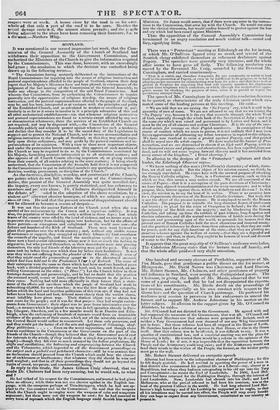There was a "Protestant" meeting at Edinburgh on the let
instant, at which Mr. O'Sullivan figured away as usual, and several of the There was a "Protestant" meeting at Edinburgh on the let instant, at which Mr. O'Sullivan figured away as usual, and several of the Scottish clergy exhibited themselves as vehement dechiiiners against Popery. The speeches were generally very tiresonie, and the whole affair seems to have gone off flatly. The following resolution was moved by the Reverend Mr. Craig, seconded by the Reverend Mr. Cunningham, and carried unanimously- " That it is sinfnl„ and therefore dangerous, for any community or nation to lend itself to the promotion of Popery, or even to be indifferent to its progress, or to fail in adopting proper measures fur emancipating men from its yoke ; auti that there is clear ground in Scripture for expecting that God alit signally manilest his displeasure against those kingdoms which contribute, or which, through the neglect of the appro- priate means for checking the progress of error, allow it to prevail or n gain the ascendancy amongst them." The speech of Mr. Cunningham in seconding this resolution deserves to be quoted, as characteristic of the truly Christian spirit which anis. mated some of the leading persons at this meeting. Ile said- " We are told that we are raising the 'No Popery' cry, which is said to be unworthy of men of sense. 'We are not ashamed to say that we are raising the 'No Popery' cry, because it is the cry that resounds through the whole Ward of God, especially through the whole book of the Revelation of John ; and it is the same cry which was raised and persevered in by Luther and Knox, and it must be the cry of all sincere and zealous Christians. It is the cry of the nt211, dered saints fiw revenge on their Popish murderers. In consequence of the course of conduct which we mean to pursue, it is not unlikely that I may have future opportunities of addressing my fellow townsmen in regard to this subject. We have now resolved to raise a protest against Popery, and that protest shall be urged over the whole empire. iVe hare :inflated the banner if Pro- testantism, and we arc determined to elevate it on high until Popery, witk its ten thousand curses and plagues and abominations, has been expelled front our land, and we will not cease urging forward this cry until it has ascended from every corner of the kingdom." ( Great cheering.) In allusion to the designs of the " Protestant" agitators and their leader, the Edinburgh Observer says- " We know nothing of this man's (O'Sullivan's) character; of which, there- fore, we shall not speak. But the object of his mission cannot, we think, be too strongly reprobated. He comes here with the avowed purpose of attacking the Roman Catholic religion. Now, in a Protestant country, such as this in which we live, this seems a very useless errand. We are all convinced of the errors of Popery—that it is a corruption of the pure doctrines of Christianity : we have long abjured transubstantiation and the seven sacraments; and to what purpose, then, lecture against these, which we disbelieve and disavow ? In this view, the omission is, to say the least of it, useless. There is no occasion here for a dispassionate discussion of the Roman Catholic doctrines. But truly this is not the object of the present lecturer. He is employed to revile the Roman Catholics. His purpose is to rekindle the long-dormant flames of intolerance and bigotry ; to plead for the reign of Orangeisin in Ireland ; for the rule of the minority of the Irish over the majority; and by blackening the Roman Catholics, and raking up from the rubbish of past history, long-forgotten and obsolete calumnies, and all the mutual recrimination of hostile sects during the ignorant and persecuting ages of the world, to persuade his hearers that the present race of Roman Catholics hold the most obnoxious and immoral tenets: and the practical inference he draws from these calumnies is, that they are unfit for power, unfit for any digh functions of the state—that they are plotting de- structive schemes against the welfare of society—that they are a degraded and immoral race—and that, in short, they ought to be hewers of wood and drawers of water to the Protestants."
It appears that the great majority of O'Sullivan's audience were ladies. The Caledonian Mercury states that the lecture went off heavily, and that the whole affair produced very slight sensation.


























 Previous page
Previous page